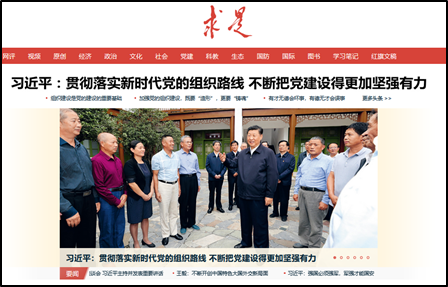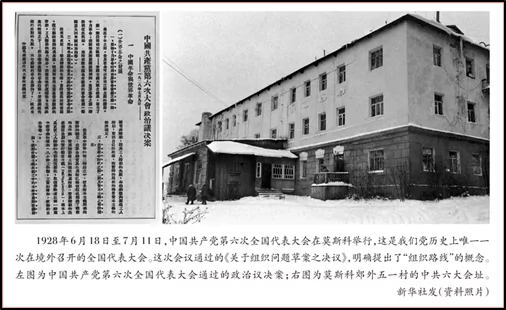
The CCP’s Official Journal Falls in Line with Xi Jinping’s Cult of Personality
Publication: China Brief Volume: 20 Issue: 14
By:

Introduction
Since 1988, the journal Qiushi (求是), produced bimonthly by the Chinese Communist Party (CCP) Central Committee, has served as the CCP’s leading official theoretical journal. Commenced under the tenures of then-CCP General Secretary Zhao Ziyang and then-paramount leader Deng Xiaoping, the journal was intended to further signal the CCP’s turn towards pragmatism in the 1980s, and it eclipsed in importance the Party’s more Maoist publication Red Flag (红旗, Hongqi). [1] For more than three decades Qiushi has served as the premier outlet for the CCP’s official positions on policy and ideology, and the journal describes itself as “the publication of the party central organs, [providing] an important ideological and theoretical position for the Party Center to guide the work of the entire party and the entire country” (Qiushi, August 20, 2018).
As the journal of the party leadership, Qiushi has always reflected the CCP’s official ideological trends of the moment, and it has hardly been an outlet for the free exchange of ideas. However, under the tenure of current CCP General Secretary Xi Jinping, the journal—like virtually every other state publication and media outlet—has become more and more a vehicle for promoting Xi’s steadily growing cult of personality. In its present form, Qiushi has become virtually a “call-and-response” publication, devoted to parroting praise for Xi and the ideological formulations promoted under his name. Each issue is now centered on a designated propaganda theme and semi-standard format: first, a leading article published under Xi’s name; and then, articles attributed to subordinate party organs and officials that repeat and reinforce the official message (nominally) authored by the supreme leader.
Qiushi Themes in Early Summer 2020
The issues of Qiushi published throughout early summer 2020 all illustrated this trend, with each issue centered around a speech or article attributed to Xi:
- The first issue for June focused on the theme of “comprehensively building a prosperous society” (全面建成小康社会, quanmian jiancheng xiaokang shehui) for China under CCP governance (Qiushi, Issue #11, June 1, 2020). This represented a return to a propaganda theme originally intended for broader exposure earlier in the year, before the COVID-19 outbreak pushed some state media plans to the backburner (China Media Project, January 30).
- The second June issue stressed the importance of “understanding, promulgating, and implementing the civil code” (认识颁布实施民法典, renshi banbu shishi minfadian) (Qiushi, Issue #12, June 16, 2020). The crux of this idea calls for more efficient and stringent CCP legal and administrative management of Chinese society, and parallels the theme of a Politburo “collective study session” held on this same topic in late May (China Brief, June 24).
- The issue for early July centered around the slogan “Don’t Forget [Our] Original Purpose and Firmly Remember the Mission'” (不忘初心, 牢记使命 / buwang chuxin, laoji shiming) (Qiushi, Issue #13, July 1, 2020). This slogan, unveiled in summer 2019, has been closely associated with Xi’s drive for reinforced ideological orthodoxy within the CCP, and has been the subject of multiple leadership meetings and repeated media coverage over the past year (China Brief, July 31, 2019; China Brief, January 29; China Brief, June 24).
Qiushi Themes in July and August Reinforce the CCP’s Position in Chinese Politics — and Xi’s Position as the Supreme Leader
The two most recent issues of Qiushi, published on July 16 and August 1, further illustrate this Xi-centric format. They also further illustrate a continuing and more comprehensive propaganda effort to assert the indispensable role of the CCP as China’s ruling political institution (China Brief, December 10, 2019; China Brief, December 31, 2019). The July 16 issue carried, under Xi’s name, the banner article “Communist Party Leadership Is the Most Essential Characteristic of Socialism with Chinese Characteristics,” with six further articles hammering home this theme. This included commentary from the editorial staff that “the role of General Secretary Xi Jinping as the core of the Party Center, and the core of the whole party, has clearly confirmed the great superiority of Communist Party leadership and the socialist system with Chinese characteristics” (Qiushi, July 15).
| Selected Thematic Articles in Qiushi:
The “Comprehensive Party Leadership” Issue (No. 14, July 16, 2020) |
||
| Nominal Author | Article Title (English) | Article Title (Chinese) |
| Xi Jinping
(习近平) |
Lead Article:
“Communist Party Leadership Is the Most Essential Characteristic of Socialism with Chinese Characteristics” |
中国共产党领导是中国特色社会主义最本质的特征
|
| Qiushi Editorial Dept.
(编辑部) |
“Persist In and Strengthen the Party’s Comprehensive Leadership” | 坚持和加强党的全面领导 |
| CCP Central Party School
(中共中央党校) |
“Party Leadership Determines the Nature and Direction of Socialism with Chinese Characteristics” | 党的领导决定中国特色社会主义性质和方向 |
| CCP Party History and Documents Research Institute (中共中央党史和文献研究院) | “The Historical Logic of Deepening, Understanding, Persisting In, and Strengthening Party Leadership” | 深刻认识坚持和加强党的领导的历史逻辑
|
| National Development and Reform Commission CCP Party Organization
(中共国家发展改革委党组) |
“Persist In and Strengthen the Party’s Centralized and Unified Leadership of Development and Reform Work”
|
坚持和加强党对发展改革工作的集中统一领导 |
| Communist Youth League Central Secretariat
(共青团中央书记处) |
“Persisting In Party Leadership Is the Political Spirit of the Communist Youth League” | 坚持党的领导是共青团的政治灵魂 |
| Shaanxi Province Yan’an City CCP Committee
(中共陕西省延安市委) |
“Persist In Party Leadership, Carry Forward the Yan’an Spirit” | 坚持党的领导 弘扬延安精神 |
| Source: Qiushi, Issue #14, 2020 (July 16, 2020) | ||
The role of the party was further driven home in the August 1 issue, which centered around Xi’s guidance to “implement the party’s organizational line”—a vague set of ideas related to maintaining proper political orientation, and the efficient management of CCP component organizations and CCP cadres, in order to “make party building even stronger” (Qiushi, August 1, 2020). As with other ongoing propaganda efforts to strengthen ideological indoctrination among party members (China Brief, December 31, 2019), themes from the issue sought to link current events with heroic narratives from CCP history (see photo below).

| Selected Thematic Articles in Qiushi:
The “Party Organizational Line” Issue (No. 15, August 1, 2020) |
||
| Nominal Author | Article Title (English) | Article Title (Chinese) |
| Xi Jinping
(习近平)
|
Lead Article:
“Implement the Party’s Organizational Line for the New Era, Make Party Building Even Stronger” |
贯彻落实新时代党的组织路线 不断把党建设得更加坚强有力 |
| Qiushi Editorial Dept. (编辑部) | “To Advance the Great Enterprise, Set Forth Strong Organizational Pledges” | 为推进伟大事业提供坚强组织保证 |
| Zhong Zuwen
(仲祖文) (CCP Central Org. Dept.) [2] |
“Deeply Study and Implement the Spirit of General Secretary Xi Jinping’s Important Speech, Resolutely Implement the Party’s Organizational Line for the New Era” | 深入学习贯彻习近平总书记重要讲话精神 坚定不移贯彻落实新时代党的组织路线 |
| Wang Zhengpu
(王正谱) |
“Make Great Efforts to Build the Party Organizational System” | 抓好党的组织体系建设 |
| Liu Qiang
(刘强) |
“Make Great Efforts to Build the Party Organizational Institutions” | 抓好党的组织制度建设 |
| Yu Yunlin
(喻云林) |
“Make Great Efforts to Build Governing Cadre Teams and Talent Teams” | 抓好执政骨干队伍和人才队伍建设 |
| Source: Qiushi, Issue #15, 2020 (August 1, 2020) | ||
Conclusion
As the CCP’s premier ideological journal and the official outlet of the CCP Central Committee, Qiushi is the most authoritative publication of the Communist Party central authorities. Qiushi was once a journal created, at least in theory, to supplant Maoist ideological rigidity—and to promote instead the more flexible ideological pragmatism preferred by Deng Xiaoping and others in the CCP’s top leadership echelon amid the pre-Tiananmen 1980s. The journal was never a true marketplace of ideas, and its contents reflected more official messaging than substantive open debate. However, the steady transformation of Qiushi into yet another vehicle for the obsequious praise of Xi further demonstrates just how pervasive Xi’s cult of personality has become—and just how intellectually sterile, and increasingly totalitarian in tone, discourse has become within the modern CCP. Originally founded to steer a course away from Maoist dogmatism, Qiushi has succumbed to the neo-Maoist revival of Xi Jinping.
John Dotson is the editor of China Brief. For any comments, queries, or submissions, feel free to reach out to him at: cbeditor@jamestown.org.
Notes
[1] The title Qiushi is drawn from the traditional expression shishi qiushi (实事求是), roughly meaning “to seek truth from facts”—an expression frequently associated with Deng Xiaoping’s push for pragmatic economic reforms. The characters appearing in the journal’s logo / title page are reportedly taken from Deng’s own handwriting (Qiushi English Edition, September 19, 2011).
[2] Zhong Zuwen (仲祖文) is a homonym/contraction (of 中共中央组织部文章, Zhonggong Zhongyang Zuzhibu wenzhang), and functions as a pseudonym for the CCP Central Organization Department.




